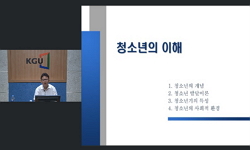이 연구는 조직간 협력관리 기술을 개발하고 조직간 협력을 적극적으로 관리하면 조직간 협력도 발전될 수 있다는 문제의식을 가지고, 아동·청소년복지서비스 조직간 협력에 영향을 미치�...
http://chineseinput.net/에서 pinyin(병음)방식으로 중국어를 변환할 수 있습니다.
변환된 중국어를 복사하여 사용하시면 됩니다.
- 中文 을 입력하시려면 zhongwen을 입력하시고 space를누르시면됩니다.
- 北京 을 입력하시려면 beijing을 입력하시고 space를 누르시면 됩니다.
아동·청소년복지서비스 조직간 협력에 영향을 미치는 요인에 관한 연구 = (A) study on the factors affecting the collaboration among social service organizations for children and youth
한글로보기https://www.riss.kr/link?id=T10642836
- 저자
-
발행사항
용인 : 강남대학교 사회복지전문대학원, 2005
-
학위논문사항
학위논문(박사) -- 강남대학교 사회복지전문대학원 , 사회복지학과 , 2006. 2
-
발행연도
2005
-
작성언어
한국어
- 주제어
-
KDC
338.5 판사항(4)
-
DDC
362.6 판사항(21)
-
발행국(도시)
경기도
-
형태사항
128p. : 삽도 ; 26cm
-
일반주기명
참고문헌: p. 104-114
- 소장기관
-
0
상세조회 -
0
다운로드
부가정보
국문 초록 (Abstract)
이 연구는 이론적 측면에서 협력에 영향을 미치는 기존 요인과 관련 개념으로부터 협력관리라는 개념을 세분화하고 그 의미를 정확하게 하였다는데 의미가 있다. 조직간 협력관리정책 수립과 실천에 힘써야 할 필요성을 주장함으로써 실천대안을 확장하는 의미를 가지고 있으며, 아동·청소년복지서비스 전달체계 구축을 위한 정책방안을 제안하였다.
이론 검토를 통하여 공식·비공식 만남, 계약, 협력담당자 선정과 같은 협력관리는 조직의 주체적 인식과 노력에 따라 발생하는 가변적인 부분이고 서비스 질의 향상을 꾀하는 관리기술로서 기존의 조직요인과는 성격이 다르다는 결과가 나타났다. 그리고 조직간 협력관리는 협력을 촉진하는 역할을 하는 요인으로서 협력결과와도 구분되는 요인임을 발견하였다.
조사 분석 결과, 첫째, 협력관리 변인인 계약, 공식·비공식만남, 협력담당자는 아동·청소년복지서비스 조직간 협력의 여러 가지 유형에 영향을 미치는 것으로 나타났다. 개인변인, 조직기능 및 구조 변인, 환경변인을 통제할 경우에도 협력관리 변인은 아동·청소년복지서비스 조직간 협력에 영향을 미치는 주요한 요인의 하나로 나타났다.
둘째, 개인변인 중에서 인맥이 아동·청소년복지서비스 조직의 협력에 영향을 미치는 것으로 나타났다. 그러나 모든 변인이 투입되었을 때, 개인변인은 의뢰받은 클라이언트 수라는 하나의 종속변인에만 영향을 미치는 것으로 나타났다. 개인의 인맥은 다양한 서비스를 확보하기 위한 프로그램 교환과 공동사업운영, 그리고 변화하는 환경에 적극적으로 대응하려는 공동대응 활동에 영향을 미치지 않는 것으로 나타났다.
셋째, 조직기능 및 구조요인 중에서는 서비스 수, 상담기관이라는 조직기능, 상근직원수와 조직의 법인화 여부가 여러 종속변인에 영향을 미치는 것으로 나타났다. 특히 서비스 수와 상담기관이라는 조직의 기능은 다른 변인이 통제하여도 유의미한 영향을 미치는 것으로 나타났다. 이 결과는 클라이언트 속성과 전문치료 상담과 프로그램을 제공하는 지방 청소년상담센터의 기능에서 연유한다고 할 수 있다.
연구의 결과, 무엇보다도 협력관리와 같은 조직의 노력이 아동·청소년복지서비스 조직간 협력에 강하게 영향을 미치는 요인으로 나타났다. 이는 클라이언트의 의뢰를 받고, 다양한 프로그램을 확보하고, 변화하는 환경에 대응하기 위해 관련조직 간의 공동대응을 하는데 조직의 주체적 노력, 투자, 관리가 중요하다는 점을 시사한다. 클라이언트의 다양한 욕구충족을 위하여 관련기관 실무자와 자주 만나고 협력 합의를 도출하기 위해 노력하고 이 모든 활동을 담당하는 협력담당자 선정과 같은 내부시스템을 만드는 조직의 정책이 조직간 협력을 더욱 활성화시킬 수 있음을 의미한다. 따라서 조직간 협력관리의 기술과 노하우, 이론의 개발을 주장하며, 조직간 협력을 위한 여러 가지 기술과 도구라는 관리활동을 서비스 조직 및 정부의 정책차원에서 제도화할 필요가 있음을 제안한다.
이 연구는 조직간 협력관리 기술을 개발하고 조직간 협력을 적극적으로 관리하면 조직간 협력도 발전될 수 있다는 문제의식을 가지고, 아동·청소년복지서비스 조직간 협력에 영향을 미치는 요인을 분석하였다. 사회복지서비스 조직간 협력에 영향을 미치는 요인에 관한 연구는 개인요인, 조직요인, 환경요인을 중심으로 진행되어 왔다. 조직간 협력에는 전문성과 인맥과 같은 개인의 특성, 조직외부 자원의존과 같은 환경특성, 조직의 규모나 기능과 같은 조직 특성이 영향을 미치는 것으로 기존 연구에서 나타났다. 한편, 최근에 조직간 협력관리가 협력에 영향을 미치는 요인이라는 관점이 제기되어 왔다. 그러나 지금까지 사회복지 조직간 협력에 영향을 미치는 요인을 밝히는 연구에서는 관리를 통하여 조직간 협력도 발전될 수 있다는 관점이 간과되어 왔다. 이 관점은 이론 및 실천에서 중요한 시사점을 제공한다는 가치를 인식하고, 협력관리요인, 개인요인, 조직요인, 환경요인을 중심으로 아동·청소년복지서비스 조직간 협력에 영향을 미치는 요인을 분석하였다.
이 연구는 이론적 측면에서 협력에 영향을 미치는 기존 요인과 관련 개념으로부터 협력관리라는 개념을 세분화하고 그 의미를 정확하게 하였다는데 의미가 있다. 조직간 협력관리정책 수립과 실천에 힘써야 할 필요성을 주장함으로써 실천대안을 확장하는 의미를 가지고 있으며, 아동·청소년복지서비스 전달체계 구축을 위한 정책방안을 제안하였다.
이론 검토를 통하여 공식·비공식 만남, 계약, 협력담당자 선정과 같은 협력관리는 조직의 주체적 인식과 노력에 따라 발생하는 가변적인 부분이고 서비스 질의 향상을 꾀하는 관리기술로서 기존의 조직요인과는 성격이 다르다는 결과가 나타났다. 그리고 조직간 협력관리는 협력을 촉진하는 역할을 하는 요인으로서 협력결과와도 구분되는 요인임을 발견하였다.
조사 분석 결과, 첫째, 협력관리 변인인 계약, 공식·비공식만남, 협력담당자는 아동·청소년복지서비스 조직간 협력의 여러 가지 유형에 영향을 미치는 것으로 나타났다. 개인변인, 조직기능 및 구조 변인, 환경변인을 통제할 경우에도 협력관리 변인은 아동·청소년복지서비스 조직간 협력에 영향을 미치는 주요한 요인의 하나로 나타났다.
둘째, 개인변인 중에서 인맥이 아동·청소년복지서비스 조직의 협력에 영향을 미치는 것으로 나타났다. 그러나 모든 변인이 투입되었을 때, 개인변인은 의뢰받은 클라이언트 수라는 하나의 종속변인에만 영향을 미치는 것으로 나타났다. 개인의 인맥은 다양한 서비스를 확보하기 위한 프로그램 교환과 공동사업운영, 그리고 변화하는 환경에 적극적으로 대응하려는 공동대응 활동에 영향을 미치지 않는 것으로 나타났다.
셋째, 조직기능 및 구조요인 중에서는 서비스 수, 상담기관이라는 조직기능, 상근직원수와 조직의 법인화 여부가 여러 종속변인에 영향을 미치는 것으로 나타났다. 특히 서비스 수와 상담기관이라는 조직의 기능은 다른 변인이 통제하여도 유의미한 영향을 미치는 것으로 나타났다. 이 결과는 클라이언트 속성과 전문치료 상담과 프로그램을 제공하는 지방 청소년상담센터의 기능에서 연유한다고 할 수 있다.
연구의 결과, 무엇보다도 협력관리와 같은 조직의 노력이 아동·청소년복지서비스 조직간 협력에 강하게 영향을 미치는 요인으로 나타났다. 이는 클라이언트의 의뢰를 받고, 다양한 프로그램을 확보하고, 변화하는 환경에 대응하기 위해 관련조직 간의 공동대응을 하는데 조직의 주체적 노력, 투자, 관리가 중요하다는 점을 시사한다. 클라이언트의 다양한 욕구충족을 위하여 관련기관 실무자와 자주 만나고 협력 합의를 도출하기 위해 노력하고 이 모든 활동을 담당하는 협력담당자 선정과 같은 내부시스템을 만드는 조직의 정책이 조직간 협력을 더욱 활성화시킬 수 있음을 의미한다. 따라서 조직간 협력관리의 기술과 노하우, 이론의 개발을 주장하며, 조직간 협력을 위한 여러 가지 기술과 도구라는 관리활동을 서비스 조직 및 정부의 정책차원에서 제도화할 필요가 있음을 제안한다.
다국어 초록 (Multilingual Abstract)
This study suggests some implications. In terms of theory, it differentiates the definition of collaboration management and provides the different angle to find collaboration determinants. In terms of practice, stressing the necessity of establishing and practicing the plan for collaboration management, it suggests us that promising strategies of management for inter-organizational collaboration in korean children and youth social service arena should be prepared.
The major findings are as follow.
First, through examining the theories, it is found that collaboration management like formal and informal meeting, contract, appointing the staff for collaboration is a changeable area by the awareness and effort and a technique for improving service quality, being different from the former organizational factors. Collaboration management is found to be a factor accelerating the collaboration and differentiating from collaboration result itself.
Second, the sub-variables of collaboration management affect several types of the collaboration among social service organizations for children and youth. Controlling the sub-variables of the individual , organizational, and environmental factor, the sub-variables of collaboration management do affect the collaboration of social service organizations for children and youth.
Third, the personal tie among the individual sub-variables affects the collaboration among social service organizations for children and youth, but it does a sub - dependent variables only. It does not affect the sub-variables of service exchanges and joint programs for providing more programs, and coping with the changing circumstances together.
Fourth, the number of services, the organizational function of counseling, the number of staffs, and incorporating among organizational factors affect several types of the collaboration. Controlling the other sub-variables, the organizational function of counseling does strongly. This results from the function youth counseling center providing the professional counseling and program.
Above all, this study demonstrates that the effort of organization like collaboration management does affect strongly the collaboration among social service organizations for children and youth, which suggests that the effort, the investment, and the management are important in the clients being refereed, providing some kinds of programs, and coping with the changing circumstances together. It means that the policy of organization which makes the staffs to participate at meetings to obtain various programs that other organizations provide, draws the agreement for collaboration, and arranges internal system for collaboration like appointing special staff activates the collaboration among organizations.
Findings of this study provides us some recommendations. The efforts to develop technique, know-how, and management theory should be made in the Korean society. Organizations and the government should encourage organizations to manage the collaboration among them and make an effort to initiate policies and programs.
The purpose of this study investigates the factors affecting the collaboration among social service organizations for children and youth in Korea. The previous research, analyzing the factors affecting the collaboration among social service organizati...
The purpose of this study investigates the factors affecting the collaboration among social service organizations for children and youth in Korea. The previous research, analyzing the factors affecting the collaboration among social service organizations, have focused on the individual, organizational, and environmental factors. According to them, the individual factor like specialty and personal tie, the organizational factor like size and function, and environmental factor like resource dependency were key determinants in the collaboration among social service organizations. However, recently it was raised a point of view that management influences the collaboration among organizations. Till now, this view has been overlooked.
This study suggests some implications. In terms of theory, it differentiates the definition of collaboration management and provides the different angle to find collaboration determinants. In terms of practice, stressing the necessity of establishing and practicing the plan for collaboration management, it suggests us that promising strategies of management for inter-organizational collaboration in korean children and youth social service arena should be prepared.
The major findings are as follow.
First, through examining the theories, it is found that collaboration management like formal and informal meeting, contract, appointing the staff for collaboration is a changeable area by the awareness and effort and a technique for improving service quality, being different from the former organizational factors. Collaboration management is found to be a factor accelerating the collaboration and differentiating from collaboration result itself.
Second, the sub-variables of collaboration management affect several types of the collaboration among social service organizations for children and youth. Controlling the sub-variables of the individual , organizational, and environmental factor, the sub-variables of collaboration management do affect the collaboration of social service organizations for children and youth.
Third, the personal tie among the individual sub-variables affects the collaboration among social service organizations for children and youth, but it does a sub - dependent variables only. It does not affect the sub-variables of service exchanges and joint programs for providing more programs, and coping with the changing circumstances together.
Fourth, the number of services, the organizational function of counseling, the number of staffs, and incorporating among organizational factors affect several types of the collaboration. Controlling the other sub-variables, the organizational function of counseling does strongly. This results from the function youth counseling center providing the professional counseling and program.
Above all, this study demonstrates that the effort of organization like collaboration management does affect strongly the collaboration among social service organizations for children and youth, which suggests that the effort, the investment, and the management are important in the clients being refereed, providing some kinds of programs, and coping with the changing circumstances together. It means that the policy of organization which makes the staffs to participate at meetings to obtain various programs that other organizations provide, draws the agreement for collaboration, and arranges internal system for collaboration like appointing special staff activates the collaboration among organizations.
Findings of this study provides us some recommendations. The efforts to develop technique, know-how, and management theory should be made in the Korean society. Organizations and the government should encourage organizations to manage the collaboration among them and make an effort to initiate policies and programs.
목차 (Table of Contents)
- 국문초록 = ⅰ
- 목차
- 제1장 서론 = 1
- 제1절 문제제기 = 1
- 제2절 연구목적 = 3
- 국문초록 = ⅰ
- 목차
- 제1장 서론 = 1
- 제1절 문제제기 = 1
- 제2절 연구목적 = 3
- 제2장 이론적 배경 = 5
- 제1절 조직간 협력에 대한 논의 = 6
- 1. 조직간 협력 관련 용어 = 6
- 2. 조직간 협력의 내용 = 10
- 제2절 조직간 협력에 영향을 미치는 요인에 대한 기존 논의 = 14
- 1. 개인 요인 = 14
- 2. 조직기능 및 구조 요인 = 17
- 3. 환경 요인 = 21
- 제3절 조직간 협력관리의 개념과 역할 = 24
- 1. 조직간 협력관리의 개념과 내용 = 25
- 2. 조직간 협력관리의 역할 = 30
- 제3장 연구 설계 = 33
- 제1절 연구 모형과 가설 = 33
- 1. 연구모형 = 33
- 2. 가설 = 35
- 제2절 변수의 조작적 정의와 측정 = 36
- 1. 독립변수와 하위변인 = 38
- 2. 종속변수와 하위변인 = 43
- 제3절 조사대상 = 45
- 제4절 자료수집 방법 = 47
- 제5절 분석방법 = 48
- 제6절 연구의 한계 = 48
- 제4장 연구의 결과 = 49
- 제1절 조사대상의 일반적 특성 = 49
- 1. 조사대상 조직 개요 = 49
- 2. 조사대상의 일반적 특성 = 53
- 제2절 조직간 협력에 영향을 미치는 변인 및 조직간 협력변인의 특성 = 58
- 1. 협력관리변인, 개인변인, 조직기능 및 구조변인, 환경변인 특성 = 58
- 2. 조직간 협력 변인 특성 = 63
- 제3절 조직간 협력에 영향을 미치는 변인 및 조직 간 협력변인의 집단간 비교 = 67
- 1. 협력관리 변인의 집단 간 비교 = 67
- 2. 개인변인의 집단 간 비교 = 68
- 3. 조직기능 및 구조 변인의 집단 간 비교 = 69
- 4. 환경변인의 집단 간 비교 = 71
- 5. 조직간 협력변인의 집단 간 비교 = 72
- 제4절 조직간 협력에 영향을 미치는 변인 분석결과 = 74
- 1. 의뢰한 클라이언트 수에 영향을 미치는 변인 = 75
- 2. 의뢰받은 클라이언트 수에 영향을 미치는 변인 = 76
- 3. 제공받은 프로그램 수에 영향을 미치는 변인 = 80
- 4. 제공받은 프로그램 운영회수에 영향을 미치는 변인 = 82
- 5. 제공한 프로그램 수에 영향을 미치는 변인 = ·84
- 6. 제공한 프로그램 운영회수에 영향을 미치는 변인 = 85
- 7. 공동사업 수에 영향을 미치는 변인 = 86
- 8. 공동사업 운영회수에 영향을 미치는 변인 = 88
- 9. 공동대응 수에 영향을 미치는 변인 = 89
- 제5절 논의 = 91
- 제5장 결론 = 98
- 제1절 연구결과의 요약 = 98
- 제2절 이론적 함의 = 99
- 제3절 사회복지 실천 함의 = 100
- 참고문헌 = 104
- Abstract = 115











